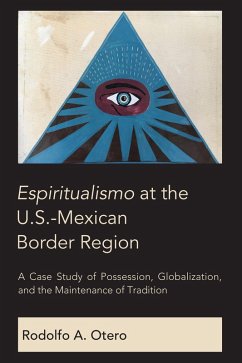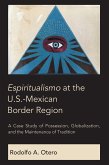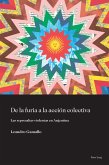Espiritualismo at the U.S.-Mexican Border Region: A Case Study of Possession, Globalization, and the Maintenance of Tradition is a sensitive, empathetic, and beautifully detailed account of the Mexican religious movement Espiritualismo Trinitario Mariano as practiced in the U.S.-Mexican border region, culminating 16 months of fieldwork. This study offers a salient portrait of a changing religion and society in Mexico and is critically relevant to the understanding of religious change in the developing world. Espiritualista symbolism at the U.S.-Mexican border, mainly manifested through spirit possession performances, is an effective system of knowledge and empowerment accessible to individuals from all levels in society. This symbolism reflects an awareness of attempts at discrediting tradition through the imposition of a "rational," modernist hegemonic perspective. According to espiritualistas at the border, the social arrangements engendered by capitalism and the strong presence of Protestantism in the area are the forces that present a direct attack on Mexican tradition. In an uneasy alliance with Catholicism, espiritualismo stands as a bastion of tradition, and at the same time, it establishes a path to modernity. This book is a major contribution to the anthropology of religion, Latin American anthropology, gender studies, medical anthropology, and studies of migration. It is an excellent supplemental reading for undergraduate and graduate courses on the anthropology of religion.
Dieser Download kann aus rechtlichen Gründen nur mit Rechnungsadresse in A, D ausgeliefert werden.
"Espiritualismo at the U.S.-Mexican Border Region seeks to confirm the existence of a dimension that supports the reality of immateriality that is beyond the usual dimensions associated with human life. Rodolfo A. Otero takes us to the U.S.-Mexico border region-a region fraught with inequalities of multiple sorts and of intense and dynamic linguistic, cultural, economic, and social changes-to provide us with a firsthand, finely tuned, ethnographic narrative and analysis of the manner in which transborder peoples resurrect and participate in Espiritualismo temples in order to contend with these circumstances. Class jumps, ethnic and cultural shifts, grave economic disparities, and linguistic experimentation lead parts of the population to inquire and join with others, like and unlike themselves, in concert to gain a kind of identity resource that buttresses these constant demands on their many selves that negotiates the daily stress of such an environment. Transborder living accentuates these dynamics, and in a kind of ethnogenesis, the espiritualistas enter into realms of immateriality through possession to deal with their material reality. This is indeed crossing borders of many sorts, and this fine work takes us there in the long tradition of exemplary anthropological analysis and presentation." -Carlos G. Vélez-Ibáñez, Regents' Professor, School of Transborder Studies and Human Evolution and Social Change, Arizona State University









